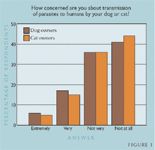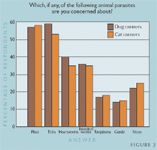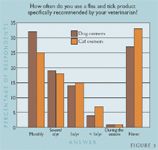What your clients know-or don't know-about parasite control
Not surprisingly, clients who visit their veterinarians at least yearly are more likely to use parasite control products, be concerned about the ramifications of parasites, and practice good hygiene to prevent parasite transmission from animals to people.
In September 2006, the Companion Animal Parasite Council (CAPC) conducted a nationwide survey of 1,041 dog and cat owners to gather information about consumer awareness of, attitudes toward, and approaches to dealing with parasite control and prevention.* The results will be used to help CAPC develop educational materials and answer questions for both pet owners and veterinarians when it comes to parasite issues.
The results of the CAPC survey show that only 41% of dog owners and 40% of cat owners take their pets to a veterinarian once a year for routine healthcare, while 15% of dog owners and 27% of cat owners only take their pets to a veterinarian every two or three years, less often than that, or never. Not surprisingly, clients who visit their veterinarians at least yearly are more likely to use parasite control products, be concerned about the ramifications of parasites, and practice good hygiene to prevent parasite transmission from animals to people.
CONCERNED... BUT NOT VERY
While 80% of pet owners surveyed are aware that parasites that can make their pets sick can also be transmitted to people, only 22% reported being extremely or very concerned about this happening (Figure 1). "It won't happen to me" seems to be the attitude adopted by many pet owners when asked about contracting zoonotic diseases from pets infected by parasites.

Figure 1
More than one-third of the survey respondents (38%) said children play in an area where their pets leave waste (such as sandboxes, lawns, and dog parks), and 21% said they never remove the waste. And only 47% said they always wash their hands after contact with a pet, leaving a wider margin of opportunity for zoonotic transmission to occur.
WHAT ARE CLIENTS DOING ABOUT PARASITE CONTROL?
While most pet owners have heard of fleas, ticks, tapeworms, heartworms, and other parasites, many are still not using proper parasite preventive measures. Fleas and ticks are the major parasites of client concern (Figure 2). Fifty-four percent of survey respondents know that fleas and ticks can be found in their houses all year long, but just 29% are concerned about parasites year-round. Of these respondents, 42% have had a problem with fleas and 23% with ticks.

Figure 2
Even when veterinarians discuss parasite control with their clients, evidence shows that compliance is poor. In this survey, only 32% of dog owners use monthly flea and tick preventives and only 40% use heartworm preventives as recommended by their veterinarians (Figures 3 & 4). And only 25% of cat owners use monthly flea and tick preventives and only 24% use heartworm preventives as recommended by their veterinarians.

Figure 3
WHAT SHOULD YOU DO?
Clearly, there is a great need for the veterinary profession to proactively and aggressively make parasite prevention and control a priority in veterinary care, not only to ensure the health of pets, but also the health and well-being of pet owners and the public. Parasites play an important role in animal and human disease. It is vital that veterinarians and their staffs develop, consistently present, and strongly advocate for a parasite control program.

Figure 4
Proper fecal diagnostic testing by centrifugal flotation, early preemptive deworming of puppies and kittens, year-round use of broad-spectrum parasiticides and heartworm preventives, proper sanitation and hygiene, and regular trips to the veterinarian are all vital to strengthening the human-animal bond and ensuring healthier pets and pet owners.
Through the efforts of CAPC and other organizations focused on wellness and preventive care, steps are being taken to increase awareness about zoonotic diseases and parasite prevention. For more information, including parasite control guidelines, visit www.capcvet.org or www.petsandparasites.com.
*Information for this article was provided by the Companion Animal Parasite Council. Contact CAPC at info@capcvet.org